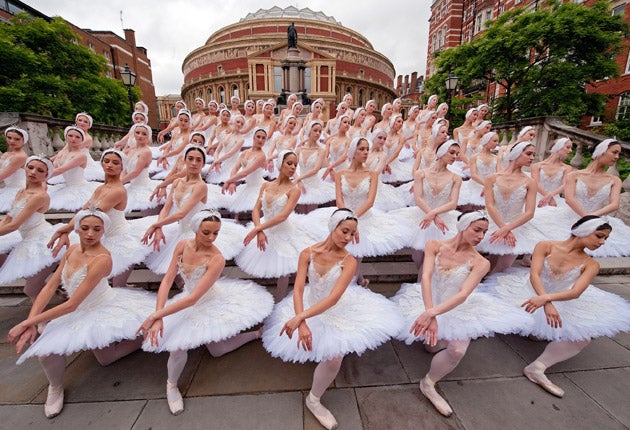Agony & Ecstasy: A Year with English National Ballet, BBC4, Tuesday<br/>Monroe, ITV1, Thursday
A documentary filmed behind the scenes at English National Ballet had drama, spectacle, and its very own Victor Meldrew

Your support helps us to tell the story
From reproductive rights to climate change to Big Tech, The Independent is on the ground when the story is developing. Whether it's investigating the financials of Elon Musk's pro-Trump PAC or producing our latest documentary, 'The A Word', which shines a light on the American women fighting for reproductive rights, we know how important it is to parse out the facts from the messaging.
At such a critical moment in US history, we need reporters on the ground. Your donation allows us to keep sending journalists to speak to both sides of the story.
The Independent is trusted by Americans across the entire political spectrum. And unlike many other quality news outlets, we choose not to lock Americans out of our reporting and analysis with paywalls. We believe quality journalism should be available to everyone, paid for by those who can afford it.
Your support makes all the difference.BBC4 bosses must be feeling smug. They got in on the ballet trend before it even was a trend, beginning to film a behind-the-scenes documentary at English National Ballet at the start of 2010.
Of course, now the series appears to be riding the Black Swan, especially when episode one focuses, like the film, on a production of Swan Lake. There are moments, hearing Tchaikovsky's portentous music, when you almost expect lesbian romps, sprouting feathers and stab wounds.
Happily for the ENB dancers, there are none of these. But billed Agony & Ecstasy: A Year With English National Ballet, the whole thing clearly has been edited to include as many grisly injuries, Svengali directors and weeping doll-like dancers as possible. There's an awful lot of close-ups of sore ankles and bruised toenails, and a voiceover that will keep telling us how hard it all is: "from injury and defeat to success and elation, will English National Ballet survive one of its toughest years?" This voiceover seems to be read from a war zone, a newsy inflection that makes it sound, bizarrely, almost like a mock commentary.
These constant attempts to up the ante feel unnecessary – the company is quite interesting enough. Plus, a cracking story emerges anyway. Newcomer Vadim Muntagirov, a 20-year-old Russian so shy and cute you just want to squeeze him, is given the lead role, alongside international star Polina Semionova. But she's too grand for rehearsals so in steps 38-year-old Daria Klimentová, supposedly past her best. Enter director Derek Deane, our high camp commander-in-chief, who thinks nothing of telling people – particularly Daria – just how terrible they are. Fond of muttering "un-bel-ieeeve-able", he might be ballet's answer to Victor Meldrew, and is certainly about as sweet tempered.
As opening night gets closer, the scheduled Swan Queen doesn't. She is stuck in Germany, sans visa. You might think Daria would jeté at the chance to play the lead role, but not so. "You think if after 20 years I do one more opening night and the critics see me I become a star? I don't think so," she says, smiling through the pain. When it comes to it, she actually does sprout (metaphorical) wings on stage, and we're told that she and Vadim end up a celebrated duo, winning rave reviews. Hopefully next week, we'll get to see a little less of their agony and a little more of the hard-won ecstasy.
Monroe is not another look back at the dramatic life story of Miss Marilyn. But we are talking about another, almost as familiar, screen archetype: the hospital drama's brilliant but troubled doctor. The title role is taken by James Nesbitt, his usual cheeky charm firmly in place. In fact, for the first in a new series, Monroe already feels like business as usual. There are the quirky ticks that let us know Monroe is some kind of maverick neurosurgeon genius: he has a pair of "lucky clogs", smokes, and is wittily rude to his colleagues and patients. There's the troubled home life: in the old operating theatre vs family dinner conundrum, pizza is left to go cold; wife sighs. There's the spiky rivalry with a fellow surgeon, the hard-boiled Ms Bremner: they're surely going to end up shagging on a gurney. And there's an overconfident young trainee: yep, the "you remind me of me" line gets wheeled out in the very first episode.
What's new, then? The programme's got a rather chilly look to it, all de-saturated blues and steely greys. A comment on the clinical nature of their work perhaps, or just a background for Nesbitt to sail through, cuffing protocol and taking swipes at officialdom? His penchant for putting on playlists of patients' desert island discs while he cuts their brains open is a nice touch; I've never witnessed surgery to the sound of The Specials before.
Nesbitt is an obvious choice for the role. His colleague Bremner may snipe, "I'm just indifferent to your twinkly self-regard", but all those knowing little smiles are rather good. That said, the script can't quite keep up with Monroe's real professional rival: Dr House. The show feels as if it's trying to grow awkwardly in the shadow of a taller, spikier, and frankly more interesting specimen. Being British, there's less psychobabble and fewer stupidly glamorous actresses than in House, but Monroe just isn't quite as smart, and the doctor-with-demons territory is pretty well covered by Hugh Laurie. Monroe needs a shot of adrenaline – and originality – before it can be diagnosed a success.
Join our commenting forum
Join thought-provoking conversations, follow other Independent readers and see their replies
Comments